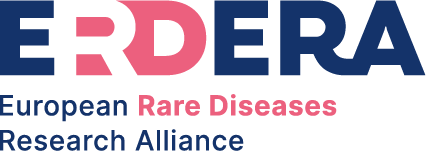About ERDERA
ERDERA – the European Rare Diseases Research Alliance – is a European partnership uniting over 170 public and private organisations across 37 countries around a single goal: turning cutting-edge science into tangible benefits for the thirty million Europeans living with a rare disease.

With an estimated overall budget of 380 million euros until 2031, ERDERA aims to have a major impact on rare diseases by supporting patient driven research to develop new treatments and diagnostic pathways and harnessing the potential of health and research data, Artificial Intelligence (AI) and digital technologies.
The European Union contributes around 150 million euros to this co-funded partnership via Horizon Europe, while the rest of the funding comes from member states, countries associated to Horizon Europe and in cash and in-kind contributions from public and private partners.
Built on the solid foundations laid by the European Joint Programme on Rare Diseases (EJP RD), ERDERA brings the community, the data and the resources together to accelerate prevention, diagnosis and treatment.
Why we cannot wait
- Around 7.000 rare diseases affect over 300 million people worldwide.
- Fewer than 5% of these conditions (rare and ultra-rare) have an approved therapy.
- The average time to diagnosis for known diseases is 4 years; yet half of patients never obtain a definitive molecular diagnosis.
- For 52% of patients and carers, the disease has a severe impact on daily life.
Our Vision
Better prevention, better diagnosis, better treatment
This is our pledge to the over 30 million people living with a rare disease in Europe.
ERDERA works towards making Europe a world leader in rare diseases research and innovation, supporting concrete health benefits to rare diseases patients through improved prevention, diagnosis and treatment.
Our mission
Transforming research and care
Working hand in hand with patients and all stakeholders, ERDERA:
- Aligns national and European funding and strategies, creating a seamless research-to-care continuum;
- Closes the translation gap so that laboratory discoveries become cost-effective solutions for patients;
- Reduces the fragmentation of knowledge and data through a federated, FAIR* ecosystem.
(*FAIR = findable, accessible, interoperable and reusable)
Our ambition
Measurable impact by 2030
- Diagnosis within 6 months for identified diseases or inclusion in a global diagnostic and research pipeline for unknown disorders.
- 1000 new therapies approved to offer a treatment to the currently 95% rare diseases with no therapeutic option available. This means expediting clinical trial readiness and regulatory fit to pave the way for approval.
- Better evaluation and understanding of the impact of RD on patients, families and health care systems to inform policy decisions.
Better Prevention Diagnosis Treatment
This is our pledge
to 30+ million people
living with a rare disease
in Europe
Our Roadmap
Five interconnected routes to success
01Generate knowledge and translate it into medical interventions
- A patient-need-led support pipeline from basic discovery to clinical-trial readiness.
- Joint public–private funding to de-risk innovation and speed up delivery.
02 Make data work for science, regulation and care
- Build on ERDRI, the EJP RD Virtual Platform, RD-Connect and other European infrastructures.
- Advance federated and centralised analytics, AI and novel trial designs for small populations.
03 Empower people living with rare diseases as equal partners
- Structured, well-resourced patient engagement in all ERDERA activities and governance.
- Training and mentoring so that lived experience directly shapes research priorities.
04 Strengthen skills and capacity across Europe
- Competitive calls coupled with tailored capacity-building for researchers, clinicians and regulators.
- An accredited, open-access online education programme that re-uses and expands high-quality modules.
05Build a truly integrated, pan-European ecosystem
- Deeper involvement of industry, regulators and payers alongside researchers and patients.
- National Mirror Groups to embed good practices and extend participation to new countries and communities.
ERDERA builds on the advancements made by former EU-funded projects such as SOLVE-RD, ERICA and the European Joint Programme for Rare Diseases (EJP RD) in advancing basic research and clinical applications, fostering patient engagement and enabling important international collaborations.
EJP RD mobilised 101 million euros (55 million came from the EU) to fund collaborative research projects. It also developed a cutting-edge virtual platform that now provides coordinated access to rare disease data, tools and resources. To build the capacity of all stakeholders involved in rare disease research, EJP RD provided training, mentoring and clinical studies support services, as well as resources such as the Innovation Management Toolbox or the Rare Diseases Clinical Trials Toolbox.
It also proved crucial for aligning international research policy agendas with national strategies.
